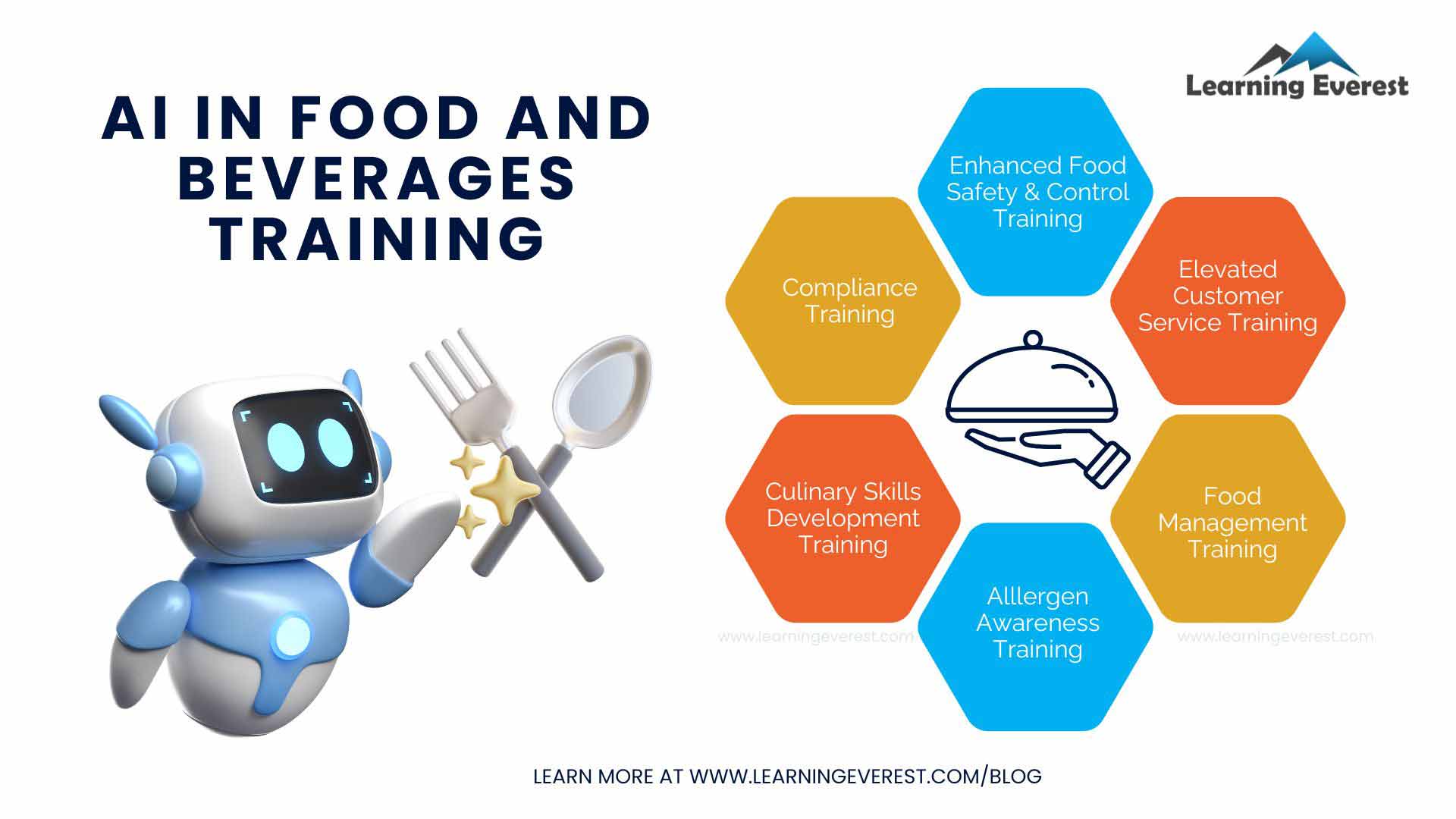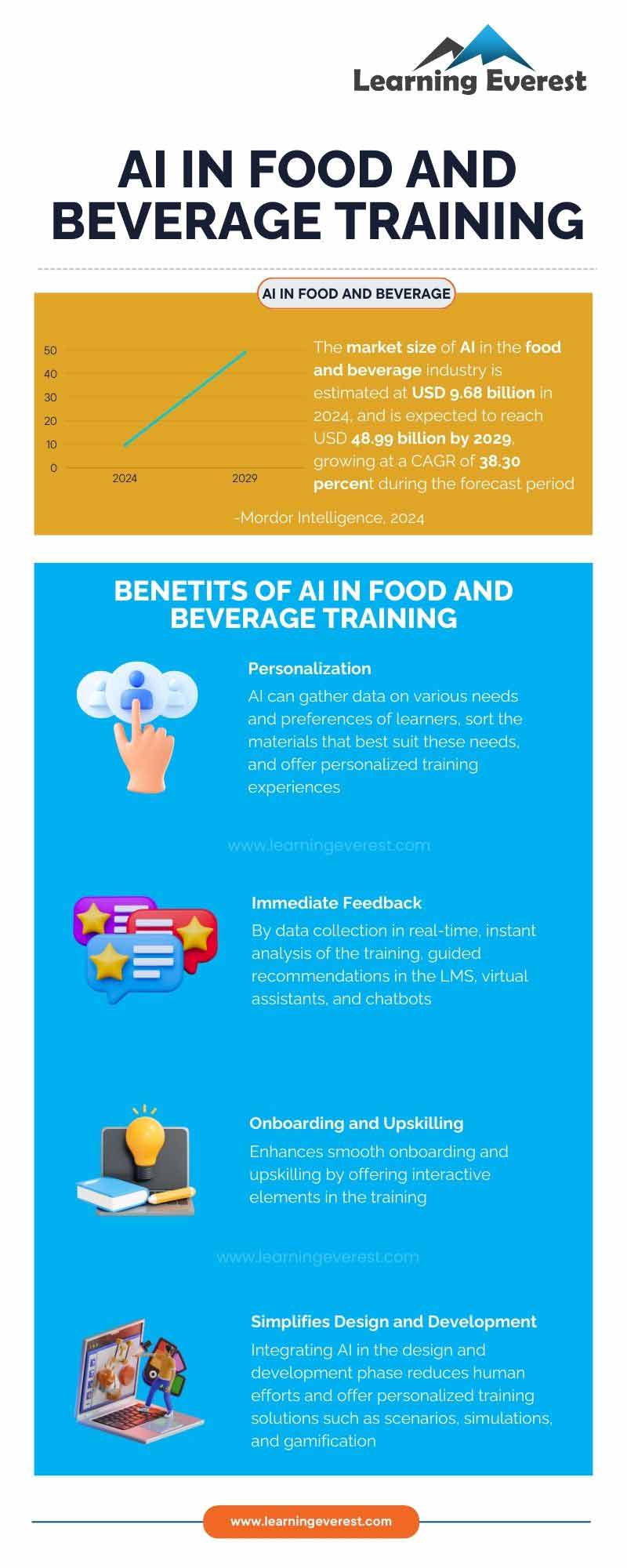AI in food and beverage industry is shaping culinary experiences by bringing innovative solutions to every aspect of the sector. The food and beverage industry offers varied training solutions to employees to equip them with the necessary skills to attain higher outcomes in the sector further enhanced through AI integration.
Table of Contents
- The Role of AI in Food and Beverage Industry
- The Aspects of AI in Food and Beverage Industry Training
- Benefits of AI in Food and Beverage Industry Training
- Conclusion
- Infographic
- Knowledge Check!
- Frequently Asked Questions (FAQs)
- What is the role of AI in food and beverage industry?
- What are the benefits of AI in food and beverage training?
Delve into the details of the role of AI in food and beverage industry, AI-enabled training for different aspects of food and beverage industry, and the benefits of AI in food and beverage training in the upcoming paragraphs.
The Role of AI in Food and Beverage Industry

AI in Food and Beverages Training
Do you know that “the market size of AI in the food and beverage industry is estimated at USD 9.68 billion in 2024, and is expected to reach USD 48.99 billion by 2029, growing at a CAGR of 38.30 percent during the forecast period?” (Source: Mordor Intelligence). This exponential growth in the market is due to the endless opportunities in varied aspects of the food and beverage industry including food production, agriculture management, supply chain administration, ensuring food safety and quality control, marketing, and sales strategies.
AI benefits the sector by conducting market research on different food preferences of audiences across various parts of the globe. Moreover, personalized nutrition based on age, health conditions, and dietary lifestyle of individuals, recipe generation, smart cooking based on inputs given, tracking inventory related to a product and forecasting tools for budgeting and attracting customers are some of the productive roles played by AI in the food and beverage industry.
The Aspects of AI in Food and Beverage Industry Training
Just as food serves as a necessity for individuals, the food and beverage industry, with its diverse functionalities, plays a critical role in society. For attaining excellence, training the employees and the leadership is imperative. The training equips the learners with the knowledge and skills required to ensure service quality, promote consumer trust, minimize errors in food preparation and handling, and food safety. The advancement of artificial intelligence has reduced the efforts of designing and developing training materials by offering easily comprehendible engaging content. The different aspects that can be covered by utilizing AI in the food and beverage industry are:
Food Safety and Hygiene Training
Food safety and hygiene training enables the employees to maintain high standards in food handling and preparation by ensuring compliance with health regulations and prevention of food against contamination. AI-powered simulations can create environments for employees to get trained on proper food handling and storage, proper temperature control, analytics to predict the risks of cross-contamination, and personalized training on food safety skills.
Customer Service Training
Customer service is a pivotal skill for employees to understand customer needs, resolve any queries or concerns, and satisfy the needs of the customers. AI-enabled customer service training addresses every aspect of delivering exceptional service to customers by fostering communication skills through virtual practice sessions and immediate feedback, scenarios for practicing handling difficult real-life situations, roleplays with chatbots to handle an array of emotions, gamified problem-solving solutions, and emotional intelligence development.
Food Management Training
A comprehensive training addressing different food operations and facilities to equip employees with efficiency in overall food operations. Apart from safety, food management focuses on inventory management, menu planning, staff management, and customer management. AI can offer interactive modules on food management equipping participants to understand past data and evaluate learner progress in streamlining the food supply chain, simulating customer interactions, and handling issues.
Allergen Awareness Training
A training designed to educate and equip employees with the knowledge of various allergens, prevention of allergic reactions, and different ways to avoid customers to be protected from food allergies. The different aspects covered in the training include identifying food allergens, symptoms of allergic reactions, cross-contamination prevention, allergen-free food preparation, communicating with the customers, and handling allergen reactions and emergencies. AI can provide automated content on the various allergens, their symptoms, evaluate allergen risks and percentages, and practice emergency scenarios.
Culinary Skills Development Training
AI in food and beverage industry training also includes culinary skills development training which involves the abilities and techniques of preparation, cooking, and presentation of food professionally. The skills include knife skills, cooking techniques and methods, sauce making, food presentation, menu planning, recipe development, time management, and culinary creativity. AI-powered virtual assistants can perform role plays on skill enhancement and suggest improvements.
Compliance Training
A critical training for ensuring the safe conduct of food business operations is compliance training which informs the employees on the need to adhere to regulatory standards, thereby maintaining quality in work. Integrating AI in compliance training simplifies the training process by informing the employees on the varied food safety regulations, the importance of following accurate food labeling, and ethical and legal compliance.
Benefits of AI in Food and Beverage Industry Training
AI in food and beverage training has varied benefits ranging from the stages of gathering data to training delivery. Let’s analyze the most common benefits.
Personalization
The most crucial benefit of incorporating AI in food and beverage training is the scope for personalizing training content. AI can gather data on various needs and preferences of learners, sort the materials that best suit these needs, and offer personalized training experiences for each individual rather than offering the same training for every individual. Moreover, AI algorithms can analyze individuals’ learned contents and progress and can suggest the food and beverage courses that best suit their learning.
Immediate Feedback
AI-powered training offers immediate feedback by data collection in real-time, instant analysis of the training, guided recommendations in the LMS, virtual assistants, and chatbots offering trainees to ask questions and queries without any hesitation and utilize the mobile-based feedback tools to real-time corrections and assessments. The feedback is unbiased and free from human errors enhancing the efficiency of the learning.
Encourages Onboarding and Upskilling
Food and Beverage Industry training is usually performed to onboard new talent with the necessary skills and knowledge and upskill existing employees with new updations and skills in the field. AI enhances smooth onboarding and upskilling by offering interactive elements in the training attracting the learners to indulge in an immersive learning process. Personalized onboarding, performance monitoring, and scalable training are offered to the learners effectively integrating AI in food and beverage training.
Simplifies Design and Development
The development of interactive, personalized training solutions such as scenarios, simulations, and gamification is a laborious task but is engaging to the learners. The rewards, badges, and points in gamification reinforce the learners in the learning process bringing retention of the concepts. Integrating AI in the design and development phase reduces human efforts and brings the best results in comprehending the learning content.
Conclusion
To sum up, AI in food and beverage industry benefits the sector in food production, agriculture management, supply chain administration, ensuring food safety and quality control, marketing, and sales strategies. AI-enabled training addresses various aspects in food and beverage industry offering interactive food and safety training, customer service training, food management training, allergen awareness training, culinary skills development training and compliance training. The benefits of AI in food and beverage training are personalization, immediate feedback, smooth onboarding and upskilling processes, and simplified design and development. Organizations can promote AI integration in all stages of training for enhanced outcomes.
Infographic
Knowledge Check!
Frequently Asked Questions (FAQs)
What is the role of AI in food and beverage industry?
The varied aspects of the food and beverage industry include food production, agriculture management, supply chain administration, ensuring food safety and quality control, marketing, and sales strategies incorporate AI. AI benefits the sector by conducting market research on different food preferences of audiences across various parts of the globe. Moreover, personalized nutrition based on age, health conditions, and dietary lifestyle of individuals, recipe generation, smart cooking based on inputs given, tracking inventory related to a product, and forecasting tools for budgeting and attracting customers are some of the productive roles played by AI in the food and beverage industry.
What are the benefits of AI in food and beverage training?
The benefits of AI in food and beverage training are personalization, immediate feedback, smooth onboarding and upskilling processes, and simplified design and development







